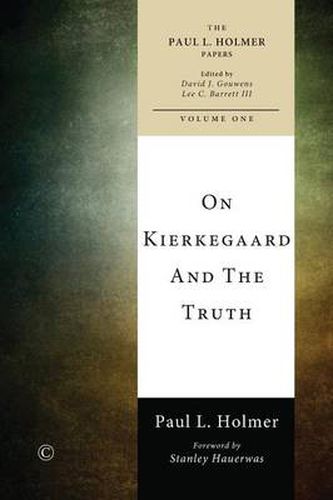Readings Newsletter
Become a Readings Member to make your shopping experience even easier.
Sign in or sign up for free!
You’re not far away from qualifying for FREE standard shipping within Australia
You’ve qualified for FREE standard shipping within Australia
The cart is loading…






Paul L. Holmer (1916-2004) was one of the most significant American students of Kierkegaard of his generation. Although written in the 1950s and 1960s, Holmer’s theological and philosophical engagement with Kierkegaard challenges much contemporary scholarly discussion. Unlike many, Holmer refuses reductionist readings that tie Kierkegaard to any particular school. He likewise criticizes biographical readings of Kierkegaard, much in vogue recently, seeing Kierkegaard rather as an indirect communicator aiming at his reader’s own ethical and religious capacities. Holmer also rejects popular existentialist readings of Kierkegaard, seeing him as an analyzer of concepts, while at the same time denying that he is a crypto-analyst. In his important reading of Kierkegaard on truth, Holmer pits Kierkegaard against those who see truth empirically, idealistically, or relativistically. His carefully textured account of Kierkegaard’s conceptual grammar of truth in ethical and religious contexts addresses immediately current discussions of truth, meaning, reference, and realism versus antirealism, relativism, and hermeneutics. It will be of great interest to all interested in Kierkegaard and his importance for contemporary theology and philosophy.
$9.00 standard shipping within Australia
FREE standard shipping within Australia for orders over $100.00
Express & International shipping calculated at checkout
Paul L. Holmer (1916-2004) was one of the most significant American students of Kierkegaard of his generation. Although written in the 1950s and 1960s, Holmer’s theological and philosophical engagement with Kierkegaard challenges much contemporary scholarly discussion. Unlike many, Holmer refuses reductionist readings that tie Kierkegaard to any particular school. He likewise criticizes biographical readings of Kierkegaard, much in vogue recently, seeing Kierkegaard rather as an indirect communicator aiming at his reader’s own ethical and religious capacities. Holmer also rejects popular existentialist readings of Kierkegaard, seeing him as an analyzer of concepts, while at the same time denying that he is a crypto-analyst. In his important reading of Kierkegaard on truth, Holmer pits Kierkegaard against those who see truth empirically, idealistically, or relativistically. His carefully textured account of Kierkegaard’s conceptual grammar of truth in ethical and religious contexts addresses immediately current discussions of truth, meaning, reference, and realism versus antirealism, relativism, and hermeneutics. It will be of great interest to all interested in Kierkegaard and his importance for contemporary theology and philosophy.